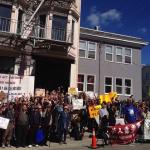Tech Boom Forcing Longtime S.F. Family Out of Home

The underside of the tech-fueled housing boom sweeping San Francisco burst noisily to the surface Wednesday when hundreds of protesters blocked the doorway to a weather-beaten building near Nob Hill to resist the eviction of an elderly Chinese American couple and their disabled daughter.
The eight-unit complex at the corner of Jackson and Larkin streets had been emptied over the past year of all occupants except for the Lee family, which has lived in their two-bedroom apartment for 34 years.
Building owner Matthew Miller gave them notice more than a year ago and intends - according to the Lees - to turn the aged building into high-end tenant-in-common units.
Poon Heung Lee, an 80-year-old retired hotel housekeeper, said he can't find anything to equal the $778 he pays monthly for his rent-controlled home, so his intention was to rebuff sheriff's deputies if they showed up to carry out the vacate order due to be served Wednesday.
A crowd of more than 200 housing-rights activists and community leaders spent the morning and early afternoon chanting and waving signs in the normally quiet neighborhood, promising to be arrested if necessary to block the eviction.
"I have no idea where we can live if we have to leave here," Lee said, speaking in Cantonese through an interpreter as he stood in his apartment with his 74-year-old wife, Gum Gee Lee. "We're hoping not to sleep in the street."
Daughter is disabled
The couple's 48-year-old mentally disabled daughter, Shiuman Lee, lives with them. According to RentJungle.com, the average rent in San Francisco for a two-bedroom apartment is $3,206 - more than the Lees, who mostly live on Social Security checks, could afford.
Miller and his lawyer did not respond to requests for comment. He is evicting the family under the state's Ellis Act, which gives him the right to oust tenants as long as he doesn't rent the units to someone else, but sells them or moves his family into them.
Miller has agreed to pay $22,000 in relocation costs for the family as required by state law, an attorney for Lee said.
Residents of the neighborhood have watched over the past couple of years as building after building was bought up and rehabilitated into snappier housing catering to higher-income people moving into the city on the wings of the area's technology surge.
On Wednesday, as the boisterous protest crowd filled the air with loud slogans and speeches, many watched with a mixture of bemusement and sorrow.
"I feel bad for the old people being evicted, and I can see why there is so much controversy," said Allie Crocco, 25, who works in finance and moved into an apartment a few blocks away this summer. "But on the other hand, there's a lot of money to be made in these buildings."
In the mid-1900s, the neighborhood became the first big Chinese immigrant enclave outside of nearby Chinatown, and many of the older buildings hold families like the Lees, said Gen Fujioka, policy director of the Chinatown Community Development Center, which is helping the Lee family fight the eviction.
He said there were at least four other Ellis Act evictions in process in the neighborhood, and others have already changed the landscape. Along with the spiffier condominiums and tenant-in-common apartments, upscale restaurants and businesses have proliferated on Polk and the other streets that form the neighborhood's backbone.
Evictions are up
Figures from the city Residential Rent Stabilization and Arbitration Board show that Ellis Act evictions shot up 81 percent over the past year, with a total of 116 ordered between mid-2012 and mid-2013.
"The rise in the tech industry here is driving this," said Sara Shortt, executive director of the Housing Rights Committee of San Francisco. "There are more and more people who can afford these condos, so there is more of an incentive to evict people and convert. Same goes for tenant-in-common units."
Supervisor Jane Kim, one of several city supervisors who showed up to support the Lees, said that with the eviction being legal - and the desire for a landlord to make money being natural - the big challenge facing the city is finding a way to accommodate low-income people being left behind by gentrification.
City law passed this summer severely limits the ability of landlords to convert rental units to condominiums without years of delay, but transforming rentals into tenant-in-common units can be done fairly quickly. TICs, as they are called, involve groups of people, usually unrelated, co-owning a building and living in separate units.
Middle-class housing
"As the market gets hot again, there's a lot of money to be made, but we have to end the incentive," Kim said. "Rent-controlled housing is our low- and middle-class housing in San Francisco, and we have to do what we can to preserve it."
As evening set in, deputies had not carried out the vacate order they were authorized to execute last month after a Superior Court judge ruled that Miller's Ellis action was valid. The sheriff's office notified the Lees last Wednesday that they had seven days to leave, said office spokeswoman Susan Fahey.
"Our eviction-assistance team has been there several times and left notice for the family to contact us, but the family has chosen not to do so," said Fahey. "We certainly don't want anybody going without a place to live, but we have our orders."
Kevin Fagan is a San Francisco Chronicle staff writer. E-mail: kfagan@sfchronicle.com
___________
&
http://www.beyondchron.org/news/index.php?itemid=11897#more
